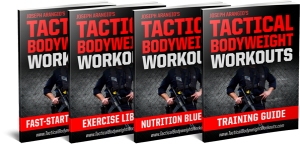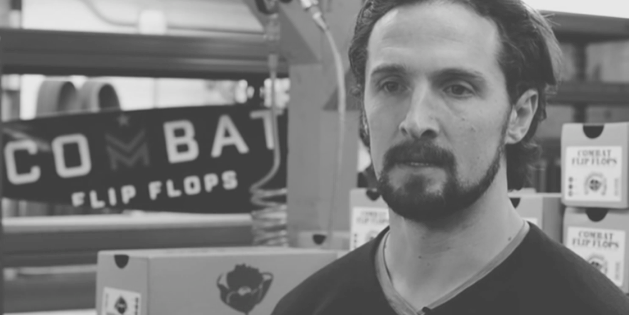As a US Army Ranger, Matthew “Griff” Griffin completed three tours in Afghanistan and a stint in Iraq. He took the skills he learned in the military and created Combat Flip Flops, a company that helps small business owners in war zones through sustainable economic opportunity.
In This 14-Minute Interrogation Interview, Ex-Army Ranger, Matthew “Griff” Griffin, Reveals…
- Why You Need a Smart Training Program
- Bad News About Randomized Workouts
- How to Rebuild Your Body With This ONE Exercise
- Secrets to Inoculate Yourself From Stress
JOSEPH ARANGIO: What makes Combat Flip Flops so unique and badass?
MATTHEW “GRIFF” GRIFFIN: It's the story. Where else are you going to find a set of flip flops from a veteran-owned small business, made in conflict areas, that helps create prosperity and security? Plus, we have a condition that ends in "retentive" and self admit to being gear junkies. We like nice toys that look good, feel good, and take a beating. All Combat Flip Flops products represent us, our story, and standards.
JA: How did your experience as an elite tactical athlete prepare you to handle the challenges and successes of Combat Flip Flops?
MG: My first commander stated, "A person's ability to lead is directly related to their physical fitness." I have yet to see anybody prove him wrong. When the cards are down and everybody is smoked, it's typically the most fit person that's able to keep their head, make good decisions, and get the mission done.
It's been a few years since I've been in, so I haven't attempted to perform at that the elite level in a while. Deployments take their toll on the body and it's tough to throw weight like a young 23-year-old Ranger.
Add kids and a company... It's not possible to put the hours in.
Business and family are not a sprint. It's a marathon. And your workouts need to reflect that. I call it "hitting the all-day button." It's a matter of seeing how far you can go while keeping your head. All-day ski tours. Epic mountain-bike rides. Bow hunting in a mountainous environment. Sleep, food, and personal training objectives are key to success.
To answer your question, my experience as a tactical athlete verified how far, fast, or hard I can push myself before failure. With more age and wisdom, you're able to take that experience to push yourself right up against that line for as long as possible. When you can do that confidently, you'll wear out your competitors.
JA: Why is it important to follow a structured and progressive tactical strength and conditioning plan?
MG: Today, the Ranger Regiment holds the standard for physical and mental conditioning. They have personal trainers, excellent equipment, and dining facilities that feed according to recovery and prep needs. Today's Rangers are straight up bad ass and you're seeing that reflected in their ability to bring the fight to the enemy, every day, for 13 years.
The only way to do this is to develop an awareness of your body, learn how it responds to training, and plan your workouts to meet mission requirements. You can't do that by doing pushups, situps, and running fast every day. It doesn't work. You'll overtrain, undertrain, or skip workouts because you feel like crap.
This isn't 1960--exercise science is readily available for everybody to exploit in order to meet a personal or professional goal. Following a proven plan and stay dedicated is the fastest path to success.
JA: Provide examples of real-world bodyweight-only workouts tactical operators are doing in the field.
MG: I haven't been in the field in years, but field workouts are for maintenance. You get strong at home or on a FOB--not in the field. At this point, you need to stay limber, flexible, and concentrate on not getting hurt. Guys do pushups, pullups, situps, air squats, and a variety of other exercises when they can--but it's tough to progress in a field environment.
Like I said earlier, I'm a little older now. If there were two things that I wish I knew then, it would be proper dieting and yoga.
Regarding diet, I use the hot-rod-V8-versus-monster-diesel analogy. Both are capable of amazing output, but they take different fuel.
Keep a diet log. Track it against your workouts. It's tedious, but worth it. When you find the right combination of diet and exercise, you'll push harder and farther than you ever thought.
Regarding yoga, if you do it right, you can promote strength, cardio, flexibility, and mental focus in less than 16 square feet. You're seeing it more widely accepted in the services now. It's my main workout when I'm away from the gym, don't have my running shoes, or get stuck in an airport while traveling. To the doubters, you should try it--at no point in time will you say, "This is bad for my body."
JA: How important is it to train in your full gear, in order to prepare you for the demands of an extra 50-75 pounds of kit?
MG: It's a fine line between conditioning and damage. Wear your kit during warmup and the mission. If you find that you're wearing your kit constantly in the name of training, you're going to wear yourself out and potentially damage your body. If you can't get out of your kit for a prolonged period of time, try to find ways to take the load of your shoulders and back. It wears on you over time if you don't do it right--and chiropractors will love you for it.
JA: How important is it to train in an "adrenalized" state? In other words, getting your heart rate above 165 bpm in order to prepare for the adrenaline dump that happens when in a stressful situation.
MG: You need to know how your body reacts at that state and do everything you can to avoid it. Push yourself. Stress shoot. Wear kit and shoot until you don't think you can lift your arms any longer. Then go more. But not all the time.
When you train in the adrenalized state, you can't help but get sloppy. Sloppy training is bad training. Focus on getting it right every time. All the time. Then push yourself to that limit where you're balancing skill and physical ability. Then when you hit the adrenalized state, your muscle memory developed over thousands of repetitions will drive your body to the right spot, at the right time, with the ability to make a good decision.
JA: As a segue, please discuss how to prepare your body to focus your vision, calm breathing, and concentrate in order to place a bullet on target... while in this adrenalized state.
MG: It's simply a matter of repetition. I read a saying that said, "Some people train until they get it right. Others train until they can't get it wrong." Be in the latter group of people. Train correctly even if it feels slower than you think you should go. Train it until you can do it with no sleep, lack of food, and after running for hours. If you can hit this level, you will do the right thing when the time comes.
JA: What future trends do you see regarding tactical strength and conditioning?
MG: That's a tough question. If I were to put my guess, I think it would be mental training. Recovery visualization, hypnosis, etc.. The guys are pushing themselves just as hard as professional athletes, so I guess the future would be conditioning the mind to handle the challenges of living a life of guts and danger.
JA: What’s your five-year plan for Combat Flip Flops?
MG: We have a lot in the works, and I can't discuss most of it. I will tell you that we intend to grow the community through bold marketing efforts, focused sales, and a transparent follow through on how we are helping those less fortunate than us. It's going to be an awesome ride. If you're up for a challenge, getting sh*t done, and having a good time--join us.
 Build Explosive Strength with the Ultimate Tactical Bodyweight Exercise Training Program... Over 100 Exercises. No Gym Required
Build Explosive Strength with the Ultimate Tactical Bodyweight Exercise Training Program... Over 100 Exercises. No Gym Required
Tactical Bodyweight Workouts is based on the teachings of tactical strength and conditioning coach, Joseph Arangio, MS, CSCS.
